
Today is the birthday of Karl Strauss (October 5, 1912-December 21, 2006). He “was a German-American brewer. He fled Nazi Germany in 1939, and went on to become a brewer, executive, and consultant in the American brewing industry. He received numerous awards during his career, which spanned both the large national brewery and the microbrew segments of the industry. Karl Strauss Brewing Company, which he helped found in 1989, continues to bear his name.”
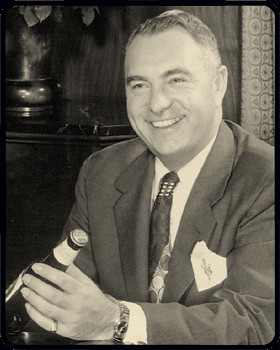
I only met Karl one time (I think) in the latter half of the 1990s during my BevMo days. In 2006, my Karl Strauss rep. from that time sent me an e-mail letting me know that Karl has passed, and I wrote the following in the blog ten years ago. “Yesterday, Karl Strauss passed away in Milwaukee at age 94. Born in Germany, and a graduate of Weihenstephan, Strauss worked for Pabst for decades before retiring as a vice-president. In 1989, along with cousin Chris Cramer and Matt Rattner, Strauss founded the San Diego microbrewery that bears his name. It was San Diego’s first one and today the company operates a brewery and six brewpubs.”
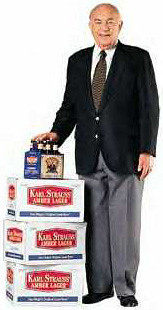
Here’s the more thorough story from the brewery website:
Karl Strauss was destined to brew beer. Born in 1912 on the premises of his father’s brewery in Minden, Germany, he spent his childhood playing amid beer barrels and sacks of fresh hops and barley. At age 19, he left home for Bavaria, the brewing capital of Germany, to attend the Technical University of Munich-Weihenstephan. There he earned a degree in the science and practice of malting and brewing, as well as a Master Brewer certification. Given the political situation in 1930s Germany, Karl had to look abroad for work. In February of 1939, he boarded the SS Manhatten and set sail for America, in pursuit of opportunity. His job search led him to Milwaukee, Wisconsin, home to one of the most famous breweries in the United States.
Karl began his career at Pabst Brewing Company on the bottling line in May, 1939. But with his strong work ethic and educational background, he quickly worked his way up the brewing ranks. In the 1950s, he was part of the team that reformulated the recipe for Pabst’s Blue Ribbon beer. The improved version catapulted sales for the company, and PBR remains an American brewing icon to this day. In 1960, Karl became Vice President of Production, overseeing all brewing operations across the country. He held the position until he retired in 1983, after 44 years with the company.
Not content to rest after his retirement, Karl launched a new career as a brewery consultant, providing expert advice to breweries all over the world. In 1986, he was approached by his cousin Chris in San Diego about starting a microbrewery. Karl thought it was a great idea. He helped design the brewery, train the brewers, and create recipes for the first beers. He was so passionate about the project that he even lent his name, face and voice to the enterprise. Karl served as Master Brewer from 1989 to 2006, remaining involved in brewery operations until his passing.
Karl was very active in the brewing community throughout his life. He was president of the Master Brewers Association of the Americas (1961-1963) and founder and director of the Museum of Beer and Brewing in Milwaukee. He is the only person to have received the MBAA Award of Merit (1981), Award of Honor (1992), and the Distinguished Life Service Award (2003). Karl also believed it was important to pass on the techniques and traditions of his craft to young brewers. We created the Karl M. Strauss Brewers Education Fund in honor of his work.
Karl had a contagious enthusiasm that inspired everyone around him. He was driven by a belief that everyone should enjoy life, preferably with good friends and good beer. Over the course of his 70 plus years as a brewer, he brewed more than seven billion servings of beer, enough for everyone on the planet to have a Karl Strauss Beer.
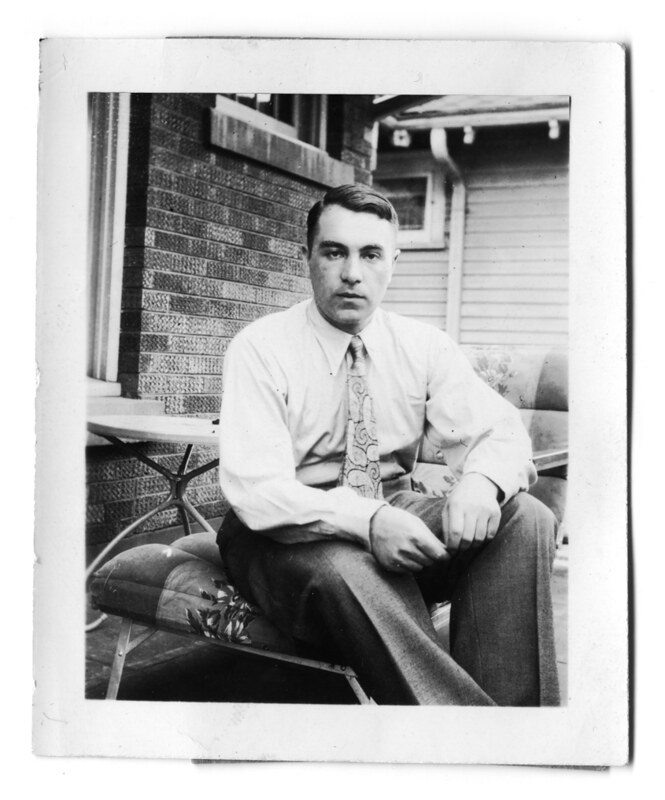
Here’s much more, from Wikipedia:
Early Life
He was born October 5, 1912, on the second floor of the administration building of the Feldschlösschen Bräu, a brewery in Minden, Germany, of which his father was president. The second born of two boys and a girl to Albrecht and Mathilde Strauss, he attended the Oberrealschule in Minden where he received his Abitur. During his young life he assisted his father as a brewer and intern while living in the family quarters at the brewery. At age 19, he went to the Technical University of Munich at Weihenstephan, where he received a degree in the science and practice of malting and brewing. In addition, he received Master Brewer certification, allowing him to teach apprentice brewers. With his diploma in hand, he began working at breweries including the Falkenkreuz Brauerei Lippert in Detmold, Westphalia; the Bauer Brauerei in Lübeck, Holstein; and the Altstädter Malzfabrik in Altstadt, Thuringia.
With the rise of the Nazis, Germany was not a safe place for the Jewish Strauss family, and work became scarce. “I graduated from college while Hitler was in power and as a Jew could not find employment in the brewing industry,” he wrote in 1943. Thanks to family living in the United States, he was able to secure sponsorship to emigrate. But other members of his family were not so lucky. The last time he saw his mother was the night he left Germany. She later was killed in a concentration camp. His brother was killed in a Nazi raid on the Polish underground.
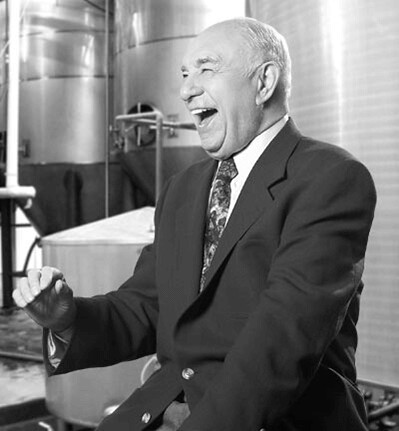
Career in America
In 1939, Strauss left Germany for the United States, followed soon by his first wife, Irene Vollweiler. He had planned to join family members in San Francisco, California, but stopped in Milwaukee, Wisconsin, at the urging of an uncle to visit family friends. While there he applied for a job with the Pabst Brewing Company, which he intended to be temporary. “I arrived in Milwaukee on St. Patrick’s Day, 1939,” he later recalled. “I started to work at Pabst on May 11, 1939, and I worked for Pabst for 44 years.”
He began his work at Pabst feeding bottles to the bottle soaker. However, “once Pabst realized that it had a Bavarian brew master in its employ, Strauss quickly advanced.” Within a few months he was promoted to foreman of filtration. He continued to quickly move up the corporate ladder, becoming an assistant superintendent and later malt house superintendent. In 1942, he was transferred to Pabst’s brewery in Peoria, Illinois, as the plant production manager. Within a few years he was made head maltster in Milwaukee and was assistant superintendent of the malt house and brewhouse. In 1948, he was promoted to superintendent of Pabst’s newly purchased plant in Los Angeles, and remained there until 1956. He was named technical director of Pabst in 1958, and promoted to vice-president of production in 1960. He helped Pabst reformulate its beer, as well as create a new Pabst Blue Ribbon. He continued as vice-president until retiring from Pabst in 1983.
His first wife died in 1978. He married his second wife, Marjean Schaefer, in 1980.
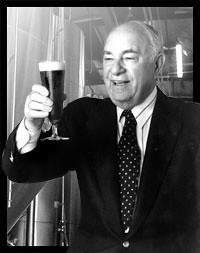
Post-retirement
In the 1980s, Strauss began a new career as a brewery consultant, providing services for both large breweries and microbreweries throughout the world. He had clients in Europe, Asia, and North America, including Molson, Tsingtao, The Boston Beer Company, and Goose Island Beer Company. He helped design more than 50 brewpubs and microbreweries.
In 1987, a cousin, Chris Cramer, and Cramer’s college roommate, Matt Rattner, asked Strauss to help them develop a brewpub in San Diego, California. Strauss not only designed the brewery and trained the brewers; he also formulated the original beer recipes and lent his name to the endeavor. Opening on February 2, 1989, Karl Strauss Brewing Company became the first brewery in San Diego in more than fifty years and is credited with having launched the craft brewing industry in San Diego. Strauss served as the brewmaster and corporate image of Karl Strauss Brewing Company. As corporate spokesman he made radio commercials in his thick German accent, always concluding “…or my name isn’t Karrrrl Strrrrrauss!”; on the technical side he was heavily involved in the design of the company’s new properties and brewing of new beers. He remained actively involved with the company until his death in Milwaukee on December 21, 2006, at the age of 94. He is buried at Mount Sinai Memorial Park in Los Angeles.
Strauss co-authored a book, The Practical Brewer, published by the Master Brewers Association of the Americas.
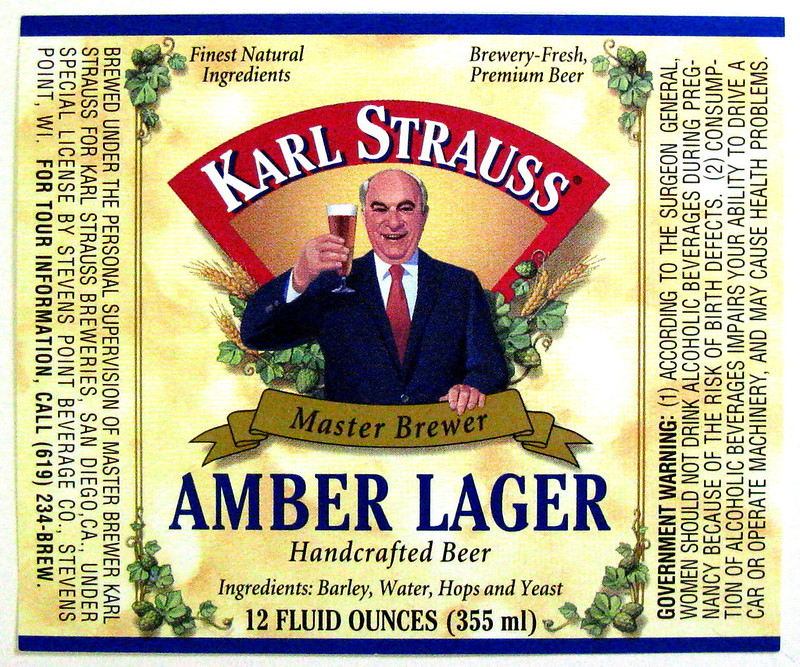
Legacy
Strauss was president of the Master Brewers Association of the Americas from 1961–63. He is the only person to receive all three of the highest awards given by the association: the Award of Merit (1981), given to an individual or individuals who made an outstanding contribution to the brewing industry; the Award of Honor (1992), given to a member who has rendered outstanding service to the association; and the Distinguished Life Service Award (2003), which recognizes MBAA members who have given exceptional service to the association.
Karl was a founder and director of the Museum of Beer and Brewing in Milwaukee. The museum now presents an annual Karl Strauss Award to individuals for lifetime contributions to the industry.
In 2006, Karl Strauss Brewing Company set up the Karl Strauss Brewers Education Fund with the Jewish Community Foundation of San Diego. The fund provides financial educational support to aspiring southern California brewers pursuing a career in the field of brewing.
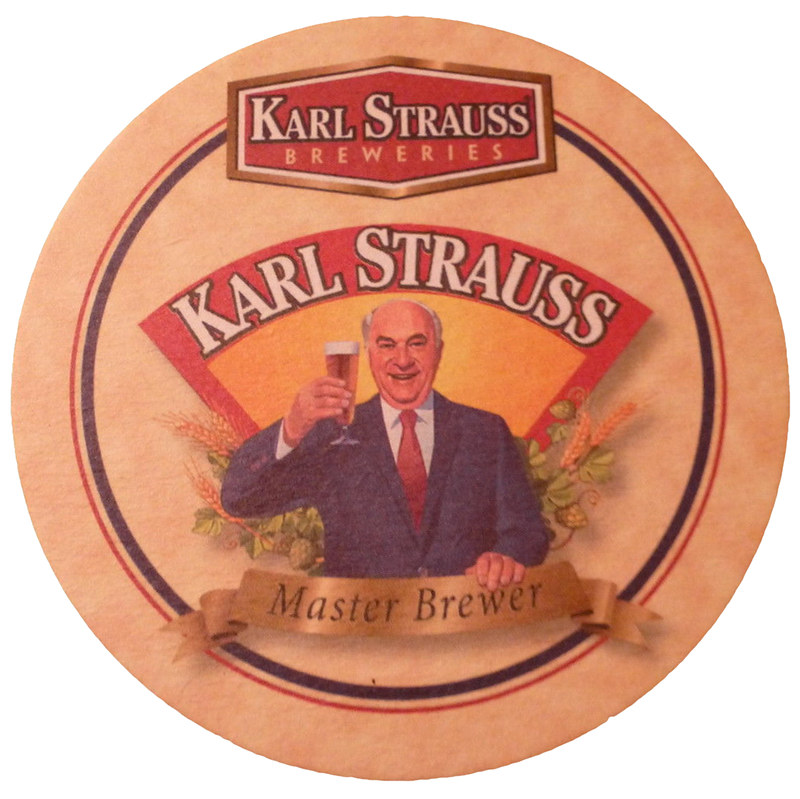
And finally, here’s a video celebrating what would have been Karl’s 100th birthday in 2012.

A paragon of “class act” he was. I’ve been to all 3 of the SD Co locations (downtown/La Jolla/Carlsbad) more than once over the last 15+ yrs. I know I’ll find a good one-off along w/my favorites of theirs any time I go – & they make the best seared ahi salad & poke I’ve ever had.